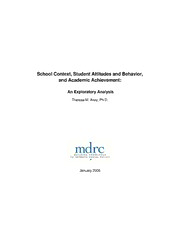Table Of ContentSchool Context, Student Attitudes and Behavior,
and Academic Achievement:
An Exploratory Analysis
Theresa M. Akey, Ph.D.
January 2006
This paper was funded by the William T. Grant Foundation and the Bill & Melinda Gates Foundation.
Principal funding for First Things First comes from the Institute of Education Sciences, U.S. Depart-
ment of Education. Additional support to supplement the core project comes from the Ford Founda-
tion, the Bill & Melinda Gates Foundation, the William T. Grant Foundation, and the Ewing Marion
Kauffman Foundation. A grant from the Pew Charitable Trusts for MDRC’s research methodology
initiatives was an important source of funding for the First Things First Classroom Observation Study.
Dissemination of MDRC publications is supported by the following funders that help finance MDRC’s
public policy outreach and expanding efforts to communicate the results and implications of our work
to policymakers, practitioners, and others: Alcoa Foundation, The Ambrose Monell Foundation, The
Atlantic Philanthropies, Bristol-Myers Squibb Foundation, Open Society Institute, and The Starr
Foundation. In addition, earnings from the MDRC Endowment help sustain our dissemination efforts.
Contributors to the MDRC Endowment include Alcoa Foundation, The Ambrose Monell Foundation,
Anheuser-Busch Foundation, Bristol-Myers Squibb Foundation, Charles Stewart Mott Foundation,
Ford Foundation, The George Gund Foundation, The Grable Foundation, The Lizabeth and Frank
Newman Charitable Foundation, The New York Times Company Foundation, Jan Nicholson, Paul H.
O’Neill Charitable Foundation, John S. Reed, The Sandler Family Supporting Foundation, and The
Stupski Family Fund, as well as other individual contributors.
The findings and conclusions in this report do not necessarily represent the official positions or policies
of the funders.
For information about MDRC and copies of our publications, see our Web site: www.mdrc.org.
Copyright © 2006 by MDRC. All rights reserved.
Overview
What are the key factors that promote academic success among students whose demo-
graphic characteristics and school circumstances place them at high risk of failure? This paper
provides highly suggestive, although not conclusive, answers to this question. Through path
analysis modeling techniques applied to data collected in MDRC’s evaluation of the First
Things First school reform initiative in a large urban school district, the paper explores the in-
fluence of two psychological variables — student engagement and perceived academic compe-
tence — on achievement in reading and mathematics.
This study’s findings may have important implications for understanding how students
learn in the classroom. Consonant with previous research, they indicate that both engagement in
school and students’ perception of their own academic competence influence achievement in
mathematics for high school students. But the study departs from earlier work in suggesting that
perceived academic competence may be more influential than engagement in boosting achieve-
ment in both mathematics and reading. Indeed, analyses indicate that perceived competence had a
stronger influence on subsequent engagement than engagement had on students’ perceptions of
themselves as competent learners.
The findings also make clear that supportive teachers and clear and high expectations
about behavior are key to the development of both student engagement and perceived compe-
tence. This study suggests that the earlier schools and teachers begin to build students’ confi-
dence in their ability to do well, the better off students will be. Because students’ perceptions of
their capacity for success are key to their engagement in school and learning, schools should be
designed to enhance students’ feelings of accomplishment. Teachers whom students see as sup-
portive and who set clear expectations about behavior help create an atmosphere in which stu-
dents feel in control and confident about their ability to succeed in future educational endeavors.
iii
Contents
Overview iii
List of Tables and Figures vii
Acknowledgments ix
Introduction 1
Contextual and Psychological Predictors of Student Learning and Success:
A Review of the Literature 3
Research Methods and Design 6
Results 16
Study Limitations 29
Implications for Research and Practice 31
Appendix: Survey Items Used to Create Student Attitudes and Behavior Scales
and School Context Scales 33
References 37
v
List of Tables and Figures
Table
1 Constructs Measured, Data Sources, and Timeline for Data Collection 8
2 Means and Standard Deviations of All Analysis Variables 17
3 Influence of Student Attitudes and Behavior on Mathematics Achievement 18
4 Influence of Student Attitudes and Behavior on Reading Achievement 20
5 Influence of School Context on Student Engagement 23
6 Influence of School Context on Perceived Academic Competence 25
7 Cross-Lagged Influence of Student Engagement and Perceived
Academic Competence 27
8 Cross-Lagged Influence of Student Engagement, Perceived
Academic Competence, and School Context 28
Figure
1 Theoretical Model 2
2 Influence of Student Attitudes and Behavior on Student Academic Achievement 12
3a Lagged Model of Influence of School Context on Student Engagement
and Perceived Academic Competence 13
3b Concurrent Model of Influence of School Context on Student Engagement
and Perceived Academic Competence 13
4 Cross-Lagged Model of Relationship Between Student Engagement
and Perceived Academic Competence 14
5 Cross-Lagged Model of Relationship Between Student Engagement
and Teacher Support 15
vii
Acknowledgments
Thank you to Howard S. Bloom, Janet Quint, and Alison Rebeck Black from MDRC
for their oversight and feedback in shaping this paper into its current form and for creating a
storyline that informs both practice and policy.
Thank you also to MDRC’s Fred C. Dolittle, James J. Kemple, and Corinne Herlihy,
who also provided valuable insight as we identified the best strategies for analyzing, presenting,
and discussing the findings of this paper.
Special thanks to Marla Thompson for her creation of new tables and charts and for
pulling together the text and figures, to Edmond Wong and Patt Pontevolpe for their assistance
with the exhibits, to Margaret Bald for her thoughtful editing of the final paper, and to Stephanie
Cowell for preparing it for publication.
ix

